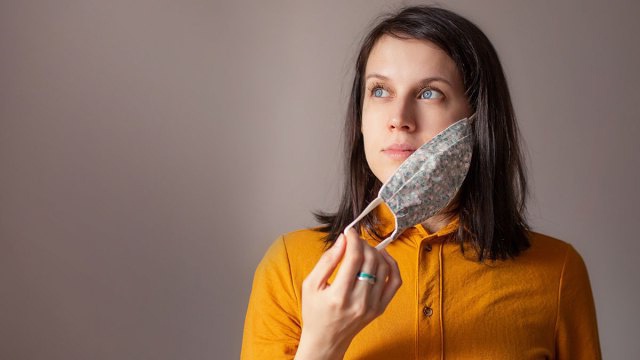With rights come responsibilities. If we believe in a principle, but don’t apply it ourselves, that principle is essentially meaningless

It’s after work and you’ve gone to the supermarket to grab some ingredients for dinner. You’re tired, anxious and pretty hungry. Plus you have to put on a mask because a thousand other people are there, and social distancing is hard to enforce at this moment. Now you’re uncomfortable, on top of everything.
We all feel this way sometimes. But we tolerate it because there’s a pandemic and we all have to do our part to keep everyone safe.
Except that one person.
There’s that one person at the front of the line being asked to step out and put on a mask before coming into the shop. And they’re putting on a scene, yelling about their rights to go unmasked, to be able to breathe, to be free of oppression.
This is hypocrisy.
Anti-maskers believe they have rights. But in refusing to wear a mask, they are denying other people the right to live in security.
Why is hypocrisy so bad?
When we are hypocritical, we create injustices. We may fail to do the right thing, which might hurt people or even make them sick.
But the biggest problem with hypocrisy is that it causes a complete breakdown of our own personal truth.
If we believe in a principle, but don’t apply it ourselves, that principle is essentially meaningless.
Many dictatorships and fascists are fantastic hypocrites. They often say they are defending some theoretical value – like national security, cultural tradition or even freedom — but there’s no value or meaning in an abstract notion of security or freedom if you murder and oppress your people.
Not all hypocrisy ends with bloodshed but we can have some pretty poor outcomes regardless. One of the more fundamental hypocrisies comes from ignoring the responsibility that comes with every right.
You want the right to live? Then you have a responsibility to the rights of others to live.You want to own stuff? You have a responsibility to respect the property rights of others.You want to use a public space? You have a responsibility to share that space with others.To believe you have a right without a corresponding responsibility is hypocritical — a double standard where you’ve likely considered the abstract principle but not the specific situation.
Why is it bad, particularly now?
We may not agree on what we need to do but right now we can’t afford to ignore evidence and truth.
Take public goods. These are shared spaces and qualities we all benefit from: education, clean air and water, health and the environment.
Without the public good of health, we get sick, the economy shuts down, we lose loved ones to disease. Our quality of life drops dramatically without good public health.
A hypocritical viewpoint says: “I’m willing to benefit from good public health but I’m not willing to maintain it”.
Hypocrites never would directly think or say this. Instead, they would see the issue as a fulfilment of a different abstract right. This might look like “I have a right to be unmasked in public”.
This right may exist, or it may not. However, if you think public health is a good thing but you aren’t willing to take a basic measure of responsibility for it — like wearing a mask — that’s hypocrisy. It can make a disaster worse for everyone.
What can we do to check ourselves for hypocrisy?
One of the best ways to avoid hypocrisy is to make our own moral principles far more specific. Put that abstract principle into context.
Say your principle is, “I have a right to live unmasked.” That’s not too contentious but it is vague enough to be abused.
Applying context to that principle could look like this: “I have a right to live unmasked even when I’m possibly an asymptomatic carrier of the worst disease to hit our country in a century.”
It’s a lot harder to defend a belief like this one.
We don’t have to share common ethics from person to person, but we do have to be consistent with ourselves. If we’re charitable and authentic in how we interpret a situation, we gain the ability to construct much stronger, much more consistent moral beliefs.